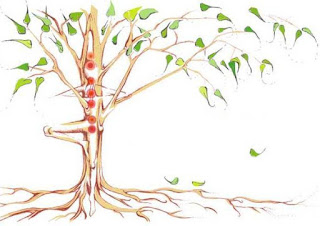
Yama and Niyama are the roots of our yoga practice. Know in depth is essential to work with each day. Only the firm foundation of Yama and Niyama is possible a true spiritual evolution, individual and social.
share a very simple and clear explanation of the Yamas and Niyamas, written by Dr. Fabian Ciarlotti in his book Yoga and Ayurveda, the editorial read.
Yama means down, slow down. The Yamas are disciplines or restraints (not be) that are divided into five moral precepts, with the goal of achieving superior mental nature. Everyone should be practiced in word, thought and action.
- Ahimsa or nonviolence:
Nonviolence not only action but also of thought and speech. It is the most sublime of yama. The Nonviolence is not just our behavior and thought with the living forms, is also pollute the environment if, how close a door, selfishness, if we shout, if we do not answer or wrong, if we hurt with words, gestures or omission, if we harm animals and plants, if we take out the trash before (is full of rats or dogs the break and spill all), if we are unkind, proud, egotistical, narcissistic, arrogant, competitive ... And violence can be also no action.
- Satyam or truthfulness:
not lie, be impeccable with the word, the word can cure or kill. Everything we say is suspended in the cosmos and makes us like karma. Exaggeration to claim, distort, manipulate or lie very nature is against us and against satyam. Go back to the importance of language. The word may heal (placebo effect) or kill (nocebo effect), great sutra: one is an owner of a slave to shut up and what he says.
- Brahmacharya or moderation (literally masters in Brahma):
moderation is to avoid excess. Moderation is the middle way in the use of the senses, much or little, nor diverted from nature. It also refers to celibacy, but not in the sense of suffer sexual abstinence, but to transform that energy into a powerful internal as expand and explain the Tantra. The semen is directly related to Ojas (fluid of life) as the control and transformation of the ojas increases and therefore, the immune system also is rejuvenating and increases sexual power. Brahmacharya is not leaving the sex, but beyond it, in addition to temper our attitudes. Is intimately related to the pratyahara, control of the senses.
- Asteya, honesty, not stealing:
Asteya means not deprive others of what is theirs. Besides we can steal money or property of another time, emotions, ideas, thoughts, discoveries, theses, books, music and more.
- Aparigraha or not covet and be generous:
Apara Sanskrit Voice, among many things, like all Sanskrit, means "outside" and Agraha "want." It is also not accumulating or hoarding.
Niyama are the observances (the other). Also divided into five and complete the ethical precepts that start with the yama.
- Saucha, cleanliness, purity:
is the internal and external cleaning. The body is a temple should be kept clean, entering sattvic things or pure, whether or food hygiene. Purity is not just bathe daily, but no smoking, stimulants, toxic substances, alcohol, meat. Is pure in what goes and what comes out. The mental purity or cleanliness in thought, word and deed. Recall that ayurveda is food for everything that comes through the senses, and if what comes is pure, my growth also will be.
- Santosha, contentment, acceptance:
Nisargadatta Maharaj says that flow through life is to be happy and in a state of acceptance. Let come what comes and go what will not only accept but be content with it, beyond what has occurred.
So, no desire, no fear, just see what happens. One is not what happens but it is who happens.
First, then, is our karma (actions and response) or, as Jesus said, you reap what you sow ... and it finally happened, this is it happened, whether good or bad, so you have to accept it.
- Tapas or austerity:
Austerity in the sense of self-discipline, intelligence and discrimination practiced, is not torturing the body and mind and numb the senses.
Austerity is not filled with unnecessary nonsense (and incidentally lower our threshold of what is truly necessary and what not). The austere lives with little outside because it is full inside.
- Svadhyaya or self-study and sacred texts.
Sva means "one self" and Adhyaya study.
is the self (atma bodha) and questioning yourself.
- pranidhana Isvara, surrender to God
is living constantly becoming aware of the divine presence and surrender to the will of God. When the ego surrenders, the mind is silent and the delivery is complete, and there is no death.
0 comments:
Post a Comment